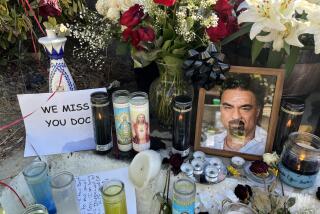Death in a Dentist’s Chair--the Odds Are 400,000 to 1
- Share via
Jose Martin Cabral’s mother had told him not to go to the dentist, at least not the one he had chosen.
Dr. Jim Drake worked for the Howard Stein Dental Group in Bellflower--too far from the family’s home in the Elysian Valley section of Los Angeles, Rosario Cabral told her 19-year-old son.
But Cabral’s girlfriend worked at the Stein clinic, and so that is where he decided to go on Friday afternoon for treatment of a toothache.
Cabral stopped breathing while having teeth removed under general anesthesia, authorities said. Paramedics rushed him to Doctors Hospital of Lakewood, where he died at 4:15 p.m. of a heart attack.
Drake, 52, apparently distraught over Cabral’s death, later suffered a heart attack himself. He was discharged from the hospital Sunday and could not be reached for comment.
The Stein clinic is a low-cost dental facility that has attracted controversy because of allegations of malpractice and fraudulent billing. The clinic and a sister facility in West Covina are headed by Dr. Howard Stein of Huntington Beach. Together, the clinics employ 50 dentists.
Last December, Stein lost a court bid to block the telecast of a “60 Minutes” segment on CBS in which he was accused of shoddy dental work, overbilling patients and failing to supervise his staff.
In an interview Monday, Stein--as he did during the CBS program--called the network’s allegations “absolutely untrue” and said they were put forth by his “enemies . . . in the dental community” who oppose his efforts to provide inexpensive care.
He refused comment on Cabral’s death.
What happened while the young man was in the dentist’s chair remained unclear Monday.
Los Angeles County sheriff’s investigators say only that county Fire Department paramedics responded to the dental offices after receiving a 911 call for a heart attack. Deputies are awaiting the outcome of an autopsy before beginning an investigation.
An autopsy was conducted Monday by the Los Angeles County coroner’s office, but spokesman Bob Dambacher said results will be delayed several weeks pending completion of laboratory tests.
Experts, however, say death in the dentist’s chair is uncommon. Only 1 in 400,000 patients who receive general anesthesia in a dentist’s office die from it, according to Dr. Frank McCarthy, chairman of the anesthesia and medicine section at the University of Southern California School of Dentistry.
That is compared to 1 in 12,000 deaths for patients who receive general anesthesia in a hospital, McCarthy said. He said the hospital mortality rate for tonsillectomies--a procedure similar to oral surgery--is 1 in 20,000.
McCarthy said a patient could die under anesthesia from any number of complications, including allergic reaction to the sedative, an undetected illness in the patient, or error on the part of the dentist administering the anesthesia.
In the last case, McCarthy said, the most common scenario is for a dentist to fail to monitor the patient’s breathing. Overdoses are uncommon, he said.
According to dental board records, Drake is a licensed oral surgeon who has a permit from the board to administer general anesthesia.
His record is “clear and in good standing,” verifications clerk Laurie Hubble said.
Nevertheless, officials said the state board is investigating the Cabral death as required by law.
In 1984, Dr. Tony Protopappas, an Orange County dentist, was convicted of second-degree murder in the deaths of three patients who received anesthesia in his office. He is appealing a 15-year sentence, which he is serving in Soledad State Prison.
As a result of the Protopappas case, the state Board of Dental Examiners immediately began enforcing a then 14-month-old law that regulated the use of general anesthesia in dental offices. Officials admitted enforcement had previously been lax.
The law, along with board regulations, requires dentists to have a minimum of two years of post-dental training in anesthesiology, or an oral surgeon’s license, before receiving permits to administer general anesthesia. The law also requires dental offices to have certain emergency equipment and drugs, and mandates an in-office evaluation of each permit holder once every five years.
The death of Cabral has left his mother, and the rest of his large and close-knit family, distraught and bewildered.
On Sunday, the family gathered at the Cabral home on Shoredale Avenue to mourn the loss.
Cabral attended John Marshall High School and, though he never graduated, he later earned an equivalency certificate. He worked at odd jobs--gas stations, fast-food restaurants, a shoe store and an upholstery shop. He loved basketball and music and had talked of marrying Laura, the girlfriend who worked at the clinic.
Inside the Cabral home, the living room was crowded with relatives trying to comfort Mrs. Cabral, who was wrapped in a blanket despite the afternoon heat. “My boy, he’s dead,” she wailed in Spanish. “I can do nothing for him.”
Cabral’s sister Odulia, 24, said her family did not know of the controversy surrounding the Stein clinic before her brother’s death. She was tearful and angry.
“What kind of a death is this?” she asked. “You go in to have your teeth pulled out and you die from it?”
More to Read
Sign up for Essential California
The most important California stories and recommendations in your inbox every morning.
You may occasionally receive promotional content from the Los Angeles Times.
![Vista, California-Apri 2, 2025-Hours after undergoing dental surgery a 9-year-old girl was found unresponsive in her home, officials are investigating what caused her death. On March 18, Silvanna Moreno was placed under anesthesia for a dental surgery at Dreamtime Dentistry, a dental facility that "strive[s] to be the premier office for sedation dentistry in Vitsa, CA. (Google Maps)](https://ca-times.brightspotcdn.com/dims4/default/8c153ef/2147483647/strip/true/crop/2010x1344+32+0/resize/320x214!/quality/75/?url=https%3A%2F%2Fcalifornia-times-brightspot.s3.amazonaws.com%2F78%2Ffd%2F9bbf9b62489fa209f9c67df2e472%2Fla-me-dreamtime-dentist-01.jpg)












